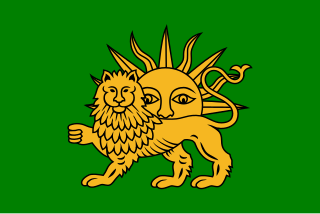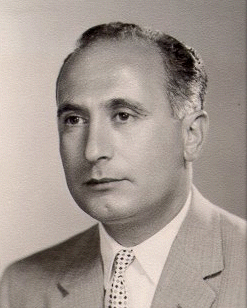Related Research Articles

Avestan is an umbrella term for two Old Iranian languages, Old Avestan and Younger Avestan. They are known only from their conjoined use as the scriptural language of Zoroastrianism; the Avesta serves as their namesake. Both are early Eastern Iranian languages within the Indo-Iranian language branch of the Indo-European language family. Its immediate ancestor was the Proto-Iranian language, a sister language to the Proto-Indo-Aryan language, with both having developed from the earlier Proto-Indo-Iranian language; as such, Old Avestan is quite close in both grammar and lexicon to Vedic Sanskrit, the oldest preserved Indo-Aryan language.

The Safavid dynasty was one of Iran's most significant ruling dynasties reigning from 1501 to 1736. Their rule is often considered the beginning of modern Iranian history, as well as one of the gunpowder empires. The Safavid Shāh Ismā'īl I established the Twelver denomination of Shīʿa Islam as the official religion of the Persian Empire, marking one of the most important turning points in the history of Islam. The Safavid dynasty had its origin in the Safavid order of Sufism, which was established in the city of Ardabil in the Iranian Azerbaijan region. It was an Iranian dynasty of Kurdish origin, but during their rule they intermarried with Turkoman, Georgian, Circassian, and Pontic Greek dignitaries, nevertheless, for practical purposes, they were Turkish-speaking and Turkified. From their base in Ardabil, the Safavids established control over parts of Greater Iran and reasserted the Iranian identity of the region, thus becoming the first native dynasty since the Sasanian Empire to establish a national state officially known as Iran.

Khājeh Shams-od-Dīn Moḥammad Ḥāfeẓ-e Shīrāzī, known by his pen name Hafez or Hafiz, was a Persian lyric poet whose collected works are regarded by many Iranians as one of the highest pinnacles of Persian literature. His works are often found in the homes of Persian speakers, who learn his poems by heart and use them as everyday proverbs and sayings. His life and poems have become the subjects of much analysis, commentary, and interpretation, influencing post-14th century Persian writing more than any other Persian author.

Atropatene, also known as Media Atropatene, was an ancient Iranian kingdom established in c. 323 BC by the Persian satrap Atropates. The kingdom, centered in present-day northern Iran, was ruled by Atropates' descendants until the early 1st-century AD, when the Parthian Arsacid dynasty supplanted them. It was conquered by the Sasanians in 226, and turned into a province governed by a marzban ("margrave"). Atropatene was the only Iranian region to remain under Zoroastrian authority from the Achaemenids to the Arab conquest without interruption, aside from being briefly ruled by the Macedonian king Alexander the Great.

Encyclopædia Iranica is a project whose goal is to create a comprehensive and authoritative English-language encyclopedia about the history, culture, and civilization of Iranian peoples from prehistory to modern times.

The Encyclopaedia of Islam (EI) is a reference work that facilitates the academic study of Islam. It is published by Brill and provides information on various aspects of Islam and the Islamic world. It is considered to be the standard reference work in the field of Islamic studies. The first edition was published in 1913–1938, the second in 1954–2005, and the third was begun in 2007.

Ehsan Yarshater was an Iranian historian and linguist who specialized in Iranology. He was the founder and director of the Center for Iranian Studies, and Hagop Kevorkian Professor Emeritus of Iranian Studies at Columbia University.
Iranian Arabs are the citizens of Iran who are ethnically Arab and speak Arabic as their native language. In 2008, their population stood at about 1.6 million people. They are primarily concentrated in Khuzestan Province.

Iranian studies, also referred to as Iranology and Iranistics, is an interdisciplinary field dealing with the research and study of the civilization, history, literature, art and culture of Iranian peoples. It is a part of the wider field of Oriental studies.

Alireza Shapour Shahbazi was a prominent Persian archaeologist, Iranologist and a world expert on Achaemenid archaeology. Shahbazi got a BA degree in and an MA degree in East Asian archaeology from SOAS. Shahbazi had a doctorate degree in Achaemenid archaeology from University of London. Alireza Shapour Shahbazi was a lecturer in Achaemenid archaeology and Iranology at Harvard University. He was also a full professor of archaeology at Shiraz University and founded at Persepolis the Institute of Achaemenid Research in 1974. After the Islamic revolution, he moved to the US, firstly teaching at Columbia University and then later becoming a full professor of history in Eastern Oregon University.

Andragoras was an Iranian satrap of the Seleucid provinces of Parthia and Hyrcania under the Seleucid rulers Antiochus I Soter and Antiochus II Theos. He later revolted against his overlords, ruling independently from 245 BC till his death.
Iranian folklore encompasses the folk traditions that have evolved in Greater Iran.
Omar Koshan, also known as Jashn-e Hazrat-e Zahra, is a yearly festival held by some Twelver Shi'i Muslims in Iran. Originally, the festival commemorated the assassination of the second caliph Umar ibn al-Khattab by the Persian slave Abu Lu'lu'a Firuz.
The Cambridge History of Iran is a multi-volume survey of Iranian history published in the United Kingdom by Cambridge University Press. The seven volumes cover "the history and historical geography of the land which is present-day Iran, as well as other territories inhabited by peoples of Iranian descent, from prehistoric times up to the present.

The Pishdadian dynasty is a mythical line of primordial kings featured in Zoroastrian belief and Persian mythology. They are presented in legend as originally rulers of the world but whose realm was eventually limited to Ērānshahr or Greater Iran. Although there are scattered references to them in the Zoroastrian scriptures—the Avesta—and later Pahlavi literature, it is through the 11th-century Iranian national epic, the Shahnameh, that the canonical form of their legends is known. From the 9th century, Muslim writers, notably Tabari, re-told many of the Pishdadian legends in prose histories and other works. The Pishdadian kings and the stories relating to them have no basis in historical fact, however.
Roger Mervyn Savory was a British-born Professor Emeritus at the University of Toronto who was an Iranologist and specialist on the Safavids. His numerous writings on Safavid political, military history, administration, bureaucracy, and diplomacy-translated into several languages have had a great impact in understanding this period.

Kenneth Womack is an American writer, literary critic, public speaker, and music historian, particularly focusing on the cultural influence of the Beatles. He is the author of the bestselling Solid State: The Story of Abbey Road and the End of the Beatles, John Lennon, 1980: The Last Days in the Life, and Living the Beatles Legend: The Untold Story of Mal Evans.
Mohammad Reza Ghanoonparvar is a Professor Emeritus of Persian and Comparative Literature at the Faculty of Middle Eastern Studies at the University of Texas, Austin, whose expertise includes the works of Simin Daneshvar, Sadeq Chubak, and Sadeq Hedayat.
Ziyadoghlu Qajar or Ziyadlu were a branch of the Qajar tribe that governed Safavid Karabakh from 1546–1554 to 1743, Astarabad in various times, Ganja Khanate from 1747 to 1805. Some authors suggested that, Qovanlu branch of Qajars who ruled Iran from 1789 to 1925, which is currently better known as Qajar dynasty was a cadet-branch of Ziyadoghlu family.
References
- ↑ "Elton L. Daniel | Yarshater Center".
- ↑ "Elton L. Daniel Home Page". www2.hawaii.edu. Retrieved 2020-05-17.
- ↑ "Daniel, Elton L. | Encyclopedia.com". www.encyclopedia.com. Retrieved 2020-05-17.